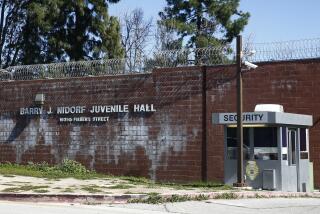COUNTYWIDE : Juvenile Hall Probes Counselors’ Actions
Authorities at the county’s Juvenile Hall in Orange are investigating allegations that counselors allowed youths to engage in gang behavior and ignored beatings that were part of gang rites.
Two deputy probation counselors have been placed on paid administrative leave as a result of the investigation, authorities said.
“My concern has to do with an alleged gang subculture which may have existed,” said Tom Wright, Juvenile Hall co-director.
However, Wright declined to identify the counselors who were placed on leave or discuss incidents that prompted the inquiry. He said Juvenile Hall authorities expect to release their findings later this week.
The matter has also been referred to the Orange County Grand Jury, which is investigating, said Frank Kroeger, the grand jury foreman. Kroeger declined to comment further Tuesday.
Juvenile authorities said the investigation focuses on one living unit which houses 22 youths. Both of the suspended counselors are assigned to the unit in question, authorities said. Juvenile Hall contains 17 living units and has an overall population of 430.
Wright said authorities launched an investigation May 13 after complaints from senior staff members about several incidents in living unit E.
“The senior staff members said they thought something was amiss,” said Bruce Malloy, administrator for the Orange County Juvenile Justice Commission, who also declined to provide specifics. The commission is charged with monitoring Juvenile Hall.
Authorities said there are seven deputy probation counselors assigned to each living unit. In addition to counseling the minors, the supervisors are charged with enforcing regulations that strictly prohibit any type of gang behavior.
Wright said the Juvenile Hall supervisors are required to enforce a list of rules concerning banned conduct. Among other things, minors are prohibited from using gang slang, exhibiting hand signs, writing gang graffiti or wearing clothing that might identify them as belonging to a gang.
Malloy said enforcement is a difficult task because the Juvenile Hall population is “more toxic than ever before.”
“Of 13,000 referrals, 70% are real serious felonies,” he said. “I think part of what you’re looking at is the probation system adjusting to the population in there.”
More to Read
Sign up for Essential California
The most important California stories and recommendations in your inbox every morning.
You may occasionally receive promotional content from the Los Angeles Times.










